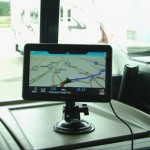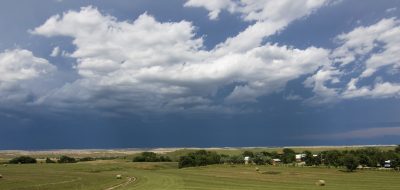Dear RV Doctor,
I have a troubling electrical issue. Last year when I plugged in my brand new RV at the campsite the GFCI (ground fault circuit interrupter) on the pedestal tripped immediately. The campground had to wire up a standard non-GFCI outlet and then everything work fine. I took the RV into the dealer for service and everything checked out fine. They said that possibly the GFCI in the coach needed to be reset or I had moisture in the plug. Recently I took the RV out of storage and plugged it into my house which had a GFCI in the circuit and it tripped again as soon as I plugged it in. I’m taking it in again for service but I am expecting a similar response that everything works fine when they plug it into their GFCI outlet. Any ideas on what might be the problem? – Jeff Hayes, (Monroe, OH)
Answer:
Jeff, you clearly have an electrical problem within the alternating current (AC) system on the RV. I would avoid using it until this situation has been resolved. Plus I doubt I’d take it back to that same dealer. At least not until their technicians get some further training.
As to the actual problem; the GFCI is tripping because it is detecting an imbalance between the hot and neutral conductors in the unit which usually indicates a leakage to ground on one of the wires. You can easily do some preliminary investigation yourself.
Purchase a plug-in circuit tester from your local hardware store. They are inexpensive, reliable and invaluable when checking out AC electrical problems within RVs and even park pedestals. In fact, I recommend that every park pedestal be tested and the voltage measured before ever plugging in for the first time.
For now, plug your coach into a non-GFCI circuit so it won’t trip during the test. Test every receptacle in the coach. Don’t forget those hidden receptacles like behind the refrigerator, microwave or convertor. If the tester indicates a problem it will be identified.
It is also possible that the GFCI receptacle in the RV is itself faulty and the park GFCI is sensing this fault and tripping first. Most well equipped RV service shops will have a GFCI test device in their tool crib. This plug-in test device applies a variable and controlled amount of leakage to the GFCI to determine if it trips at the correct level. You can also eliminate or condemn the GFCI by removing it temporarily to see if the source GFCI still trips.
Obviously, the shoreline cord should be unplugged before you remove the GFCI. Simply connect all the black wires together and the white wires together after you remove the GFCI. Be sure to note and label which is the incoming conductors and which are the downstream conductors; it makes a difference.
If the problem is eliminated by removing the GFCI then simply replace it with a like model. If the problem persists it will be necessary for a qualified service shop to run a full battery of tests including a hot skin test. There’s little else the handyman can do.
(Please feel free to comment, however, please also note that due to the volume of communications I receive from multiple channels I cannot guarantee a personal response in every instance. However, questions of an overall general interest may be considered and published in an upcoming RV Doctor column.)






Anonymous
Why would a fuse be blowing when I plug my RV into my garage. This fuse blows in my house not in my RV. This just started happening after an electrician put an outside electrical plug on the outside of my RV
Pingback: Homepage
Anthony Scavo
I have an RV that trips the Gfci inside the RV. I am an electrician but this one has me stumped. This issue is when i run the generator. I have searched the entire rig and only found this one Gfci inside the RV. I test the wire and find no fault to ground on the two load ckts out. One of them does the regular plugs and the other one does just the bedroom sink and the bathroom sink. I replaced the Gfci with a brand new on and it still trips. I made sure all devices were and are unplugged and i get the same results. Everything work fine with a regular receptacle but not with the GFCI. i am leaning towards a ground or neutral with the generator. Any advice will be a great help. the only thing i was going to do was replace all of the receptacles with new one and see if that fixes it. I seperated the two circuits and they work fine when they are seperate but when i put them both on the load side of the Gfci they trip instantly.. Very strange and a brain buster.
thanks
Anthony
John
We were having an issue like this in our Cougar travel trailer. We tracked it down to the water heater element. Apparently even if you have the water heater turned off it can trip the source GFCI. I was also told that the same type of issue can be caused by the fridge element. Might have it checked out.
Bob
I know this is an old post, but it’s an important one. The previous post by Jim is on the right track. Some trailers are wired at the factory as a “point of service”. the same as your house. At a point of service, the ground and neutral must be bonded together. This happens at the main panel in your house, but not at any sub-panel(s) downstream. Similarly, this happens at the campground’s main panel but should not happen downstream (your camper panel).
If you open up your camper panel, you will almost certainly see a wire or possibly a bonding screw connecting the ground and neutral. Disconnect it and don’t worry about it; you don’t need it.
I don’t know why some campers are wired that way and some are not. Probably something to do with local codes. My Forest River popup had to be modified; my Jayco hybrid did not.
I don’t know what happens when you throw a generator into the mix; they are probably bonded; if so your trailer should not be.
Having GFIs in series has never been a problem for me. I can plug my late model camper into my GFI circuit in my garage without incident. Perhaps older GFIs had issues.
Jim
i believe the problem is that the ground and natural are connected somewhere posable in the panel generator or inverter. not the best idea but it works get a 30 amp 120 volt adapter and disconnect the ground. this will stop the problem. and the fact that the ground is connected at the source will still have ground protection at the outlet. there are enough GFI protection in the motor home and not nesary at the pedestal on the 120 volt 30 amp outlet over kill. it would be handy to have GFI outlet 120 volt 20 amp at pedistal
Clifford Miles
Gary will two blown 40 amp fuses cause everything on a 2009 Coachman RV to shutdown ? No refrigator, air condition, lights, steps and run all batteries down. Generator would would not run anything the only thing that would run the RV is the the coach battery after I got a boost from a great camper.We were also pluged into 30 amp outlet and it would not run the RV. Took it to dealer and after $183.00 They told Me it was the two fuses hard for Me to believe, Rv still under warranty but of course fuses are not and nither is the checkout .We checked the fuses 4 times but could not detect them being blown.
THANKS Gary
Clifford Miles
larrycad
Of all the suggestions, I believe Mike has the best idea. By turning off individual breakers, you can at least isolate the problem down to a particular circuit.
David Handler, using a two prong adaptor does not remove the ground fault protection.
Don McKenzie, I have spoken to manufacturers representatives and they claim a second GFCI downstream of a first GFCI does not cause a problem. However, I am not convinced and suspect what you say may be correct, depending on the manufacturer of the particular GFCI.
Geoffrey Pruett’s comments about ground and neutral going to a separate buss is only true if the panel in question is classified by National Electrical Code as a “sub panel”. In a main panel, the ground and neutral wires are able to be mixed on the same buss bar. The panel in all RVs is a sub-panel and should have separate buss bars for ground wires and neutral wires. If the two are mixed, then the panel is wired wrong and needs to be corrected.
David Rohlader
Does anyone watch “Holmes on Homes?” He says you cannot have two GFCI plugs in series. Try bypassing the one on your RV. Since you had the campground removed their GFCI and you had no problem after that, it seems that Mike Holmes is right.
Geoffrey Pruett
In any modern electical system the wiring is all done to a set pattern when done by a knowledgeable electrician; Hot or high side is black and is divided out in the breaker box for load limits, White is common or return and goes to a buss in the breaker box or if done on the cheap a very full wire nut, Ground (not , repeat not common) is green, green cardboard sleeve or brown if older wire, and is all, repeat all to a seperate buss, or over full wire nut. Mixing these up can do much more than just sting! The ground wire at the buss is often bare copper as the sleeve or insulation is not bonded to the wire.
Our current class A has the old manual transfer switch, pull the cord back into the side compartment and plug it in so the miswired transfer switch still remains as an issue. We have two GFCI outlets which both pass the tester and have never given trouble, they were installed in 1998.
I am a retired electrician and would start with the earlier recomendation to turn off all the breakers, plug into shore power and flip them on one at a time to test. Turn off all but the master and turn them on indidvidually and if pass back off and try the next one.
If the master breaker kicks out the pole GFCI you have a potentialy lethal problem, Get it checked out.
Geoffrey Pruett
Don McKenzie
A travel trailer or 5th wheel with no generator, but wired with GFI outlets on board, will trip a GFI protected shore power circuit instantly upon being plugged in. There is no waiting until some sort of load is turned on in the trailer, and a generator’s internal wiring or hook-up is irrelevant as there is no generator. In fact, if a properly functioning PORTABLE generator is used to power the shore power cord, everything GFI wise operates normally. While a motor coach’s built in generator wiring/hook-up method, or faulty internal wiring, or faulty appliances could cause a ground fault condition to occur, the GFI will have already tripped, simultaneously with, or even before it senses the generator, or a wiring defect, or an appliance defect. Excess current flowing from hot to neutral is cut off by a current limiting devise( a fuse or breaker of some type, including a GFI breaker) Only current flowing to a ground point trips a GFI only devise, such as current flowing from a cracked and worn extension cord held in one’s hand to one’s bare feet standing on damp grass under the awning lights that are being plugged in. Or from hot to something connected to the green ground wire system, such as the metal RV frame, when plugged into shore power or running on the built in generator power.
Don
Bruce Starkey
I’d vote for a live neutral which is troublesome to find sometimes as it may not be live at all times but only when something ‘automatic’ in nature such as the fridge when operating on 120v comes on or you use something like a lamp that’s plugged into an outlet that has the live and neautral reversed.
This situation will only charge the neutral buss when that item that may be wired incorrectly within, such as an A/C unit, is called upon to start up et-voila; live neutral time!
M H Bell
I have to agree with Dan above.
[quote]
dan on April 6th, 2010 5:03 pm
I have the same problem in my coach and have been told that it is related to the fact that the generator is “self grounded” and this creates a ground fault that the GFCI is detecting properly. In talking with others, this seems to be a fairly common issue as the generators are made to be stand alone units and can be plugged into directly. Without self grounding, items plugged into the generator would not work as they could not complete the circuit.
The problem is very likely in the wiring of the automatic transfer switch (detects shore power or generator power) and the switch is “double neutral” when you connect to the shore power as the coach is grounded through the generator already. You need a qualified electrician, familiar with automatic transfer switches. to fix the wiring in the automatic transfer switch and it will be smooth sailing.
[/quote]
I had the same problem until I could not get power at all with Shore power or Generator power. The transfer relay had one of the relay wires completly burned off. Once the transfer relay was replaced. No more problem.
MH
Allen Schott
Check the outlets for moisture and stuff like leaves and seeds from trees, I had a GFI that continually tripped and it turned out to be wet debris around the other outlets connected to it.
David Handler
Please do not bypass the ground fault,if it is tripping that quick there is a major problem. Bypassing would allow the short to generate into a fire. LIke wise using a two prong adapter removes the ground fault protection.
Don McKenzie
Does the RV have any GFI receptacles permanently wired in? If it does, and it most likely does on the exterior and near any sinks, the problem is that there is a GFI (in the RV) electrically downstream from another GFI(on the pedestal). The sensor circuitry in the downstream RV GFI(even without anything plugged into it) is causing the pedestal GFI to think it(the pedestal GFI) is sensing a ground fault leakage in what is plugged into it(in this case the RV with it’s own GFI circuitry), and it is instant trip. When the campground put a regular plug-in on the pedestal, the RV’s GFI’s were protecting the more dangerous areas about the RV and were not sending feedback back to another GFI.
Having GFI protection on power pedestals a few years ago was a good safety thing, when RV’s didn’t come equipped with GFI circuits, but now that codes call for all RV’s to have their own GFI protection, either the campgrounds have to supply non GFI protected power, or if they do supply GFI protected power, then all of the RV’s GFI protected circuits need to be disconnected by turning the relevant RV breakers off. The remaining RV circuits will then be protected from the pedestal
If you look at a GFI wiring instruction sheet, note that it always shows downstream protection wired directly to the LOAD terminals of a GFI being fed directly by the line voltage. There is never another GFI downstream from the 1st GFI . The 1st GFI protects everything downstream from it IF the downstream wiring is connected to the GFI’s load terminals. If the downstream items were connected to the GFI’s Line terminals, there would be no GFI protection past that 1st GFI device. If one wired the pedestals this way, there would be 2 plug-ins on the pedestal – one for RV’s with GFI’s built in and one for older units without GFI protection built in.
This is kind of a long discourse and as you can see I am not a good technical manual writer. I should have got my niece to write this as she is a manual writer for a software firm.
Don
Thomas Becher
My motor home would sometimes trip a campground gfci and then again not. I corrected the proplem by using a CHEATER (three prong to Two) You remember those, when things first started comeing out with 3 wire cords and you only had a 2 wire plug. Go ahead and use one because the Gfci will protect you from shock if there is a problem.
keebler
my 2 cents
before you condem the GFCI how much load is (HE) putting on the GFCI.?
if this is a RV why is (HE) using a GFCI receptacle-?-normally they are only 15 amp -MAX load.
never plug a RV of any kind in with a load—your battery charger/converter might be trying to go full bors (most are 45 amp) and that alone will trip any GFCI>
dan
A small correction to my earlier comment. Where I said the generator and automatic transfer switch are “double grounded,” I should have said “double nuetral.” It is the white wires that are the problem, not the ground wires (often bare copper).
Mike
The first thing I would do is turn off all the individual breakers in the RV. Plug in the shore power and if the GFCI does not trip then start turning on the individual breakers till the GFCI trips. At least you will have an idea what circuit to start testing and/or tearing into. Isolating a problem can save hours of chasing your tale.
dan
I have the same problem in my coach and have been told that it is related to the fact that the generator is “self grounded” and this creates a ground fault that the GFCI is detecting properly. In talking with others, this seems to be a fairly common issue as the generators are made to be stand alone units and can be plugged into directly. Without self grounding, items plugged into the generator would not work as they could not complete the circuit.
The problem is very likely in the wiring of the automatic transfer switch (detects shore power or generator power) and the switch is “double grounded” when you connect to the shore power as the coach is grounded through the generator already. You need a qualified electrician, familiar with automatic transfer switches. to fix the wiring in the automatic transfer switch and it will be smooth sailing.
Brooker
I feel that the answer given is spot on for what is said, but please let me say my mind here about GFI. In theory the GFI outlets will save people and equipment ( and they do) but in recent times i have had to bypass many a GFI because it seems that they are to sensitive. I have purchased a few item brand new plug them in go to turn them on and the GFI trips. have replaced the item with a second item with the same results. Then i have tested all the items and they were perfect, but the strait load was to high for the installed or recommend GFI limit and the item will never work because it trips. So as for the tech maybe not being up to speed maybe is not the case. As alway make sure there is nothing wrong because you do not want to get hurt or cause a fire, but to be over one sided with the statement i will not go with.